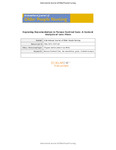Exploring Documentation in Person-Centred Care: A Content Analysis of Care Plans
| dc.contributor.author | Lydahl, D | |
| dc.contributor.author | Britten, N | |
| dc.contributor.author | Lloyd, Helen | |
| dc.contributor.author | Wolf, A | |
| dc.contributor.author | Naldemirci, O | |
| dc.contributor.author | Heckemann, B | |
| dc.date.accessioned | 2022-03-10T10:43:19Z | |
| dc.date.issued | 2022-04-08 | |
| dc.identifier.issn | 1748-3735 | |
| dc.identifier.issn | 1748-3743 | |
| dc.identifier.other | ARTN e12461 | |
| dc.identifier.uri | http://hdl.handle.net/10026.1/18928 | |
| dc.description.abstract |
<jats:title>Abstract</jats:title><jats:sec><jats:title>Background</jats:title><jats:p>Person‐centred care is a growing imperative in healthcare, but the documentation of person‐centred care is challenging. According to the Gothenburg Framework of Person‐centred Care, care should be documented in continuously revised care plans and based on patients’ personally formulated <jats:italic>goals</jats:italic> and <jats:italic>resources</jats:italic> to secure a continuous partnership.</jats:p></jats:sec><jats:sec><jats:title>Objectives</jats:title><jats:p>This study aimed to examine care plans produced within a randomised controlled trial that tested a person‐centred care intervention in older people with acute coronary syndrome. Nurses with training in the theory and practice of person‐centred care had written the care plans.</jats:p></jats:sec><jats:sec><jats:title>Methods</jats:title><jats:p>We conducted a secondary analysis of care plans developed in a randomised controlled trial for assessing person‐centred care in patients with acute coronary syndrome (Myocardial Infarct [MI] or unstable angina pectoris). The study sample included 84 patients, with three care plans for each patient from inpatient (T1), outpatient (T2) and primary care (T3), that is, a total of 252 care plans. We conducted a descriptive quantitative content analysis of the care plans to examine the reported patients' life‐world and medical/health resources and goals.</jats:p></jats:sec><jats:sec><jats:title>Results</jats:title><jats:p>The analysis illustrates the differences and overlaps between life‐world and medical/health goals and resources. The documented goals and resources change over time: life‐world goals and resources decreased with time as medical/health goals and resources documentation increased.</jats:p></jats:sec><jats:sec><jats:title>Conclusions</jats:title><jats:p>This paper illustrates that in the setting of a randomised controlled trial, nurses with training in person‐centred care recorded fewer life‐world and more medical/health goals over time. Placing life‐world goals at the top of the goal hierarchy enables alignment with medical/health goals. Further research should explore whether the goals and resources documented in care plans accurately reflect patients' wishes as they transition along the care chain.</jats:p><jats:p>Trial registration: Swedish registry, Researchweb.org, ID NR 65 791.</jats:p></jats:sec> | |
| dc.format.extent | e12461- | |
| dc.format.medium | Print-Electronic | |
| dc.language | en | |
| dc.language.iso | en | |
| dc.publisher | Wiley | |
| dc.subject | chronic illness | |
| dc.subject | goal setting | |
| dc.subject | person-centred care | |
| dc.subject | qualitative content analsysis | |
| dc.subject | qualitative research | |
| dc.title | Exploring Documentation in Person-Centred Care: A Content Analysis of Care Plans | |
| dc.type | journal-article | |
| dc.type | Journal Article | |
| dc.type | Randomized Controlled Trial | |
| plymouth.author-url | https://www.webofscience.com/api/gateway?GWVersion=2&SrcApp=PARTNER_APP&SrcAuth=LinksAMR&KeyUT=WOS:000779288300001&DestLinkType=FullRecord&DestApp=ALL_WOS&UsrCustomerID=11bb513d99f797142bcfeffcc58ea008 | |
| plymouth.issue | 5 | |
| plymouth.volume | 17 | |
| plymouth.publication-status | Published | |
| plymouth.journal | International Journal of Older People Nursing | |
| dc.identifier.doi | 10.1111/opn.12461 | |
| plymouth.organisational-group | /Plymouth | |
| plymouth.organisational-group | /Plymouth/Faculty of Health | |
| plymouth.organisational-group | /Plymouth/Faculty of Health/School of Psychology | |
| plymouth.organisational-group | /Plymouth/REF 2021 Researchers by UoA | |
| plymouth.organisational-group | /Plymouth/REF 2021 Researchers by UoA/UoA04 Psychology, Psychiatry and Neuroscience | |
| plymouth.organisational-group | /Plymouth/Research Groups | |
| plymouth.organisational-group | /Plymouth/Research Groups/FoH - Community and Primary Care | |
| plymouth.organisational-group | /Plymouth/Research Groups/Institute of Health and Community | |
| plymouth.organisational-group | /Plymouth/Research Groups/Institute of Translational and Stratified Medicine (ITSMED) | |
| plymouth.organisational-group | /Plymouth/Research Groups/Institute of Translational and Stratified Medicine (ITSMED)/CCT&PS | |
| plymouth.organisational-group | /Plymouth/Research Groups/Plymouth Institute of Health and Care Research (PIHR) | |
| plymouth.organisational-group | /Plymouth/Users by role | |
| plymouth.organisational-group | /Plymouth/Users by role/Academics | |
| dc.publisher.place | England | |
| dcterms.dateAccepted | 2022-03-08 | |
| dc.rights.embargodate | 2022-4-23 | |
| dc.identifier.eissn | 1748-3743 | |
| dc.rights.embargoperiod | Not known | |
| rioxxterms.versionofrecord | 10.1111/opn.12461 | |
| rioxxterms.licenseref.uri | http://www.rioxx.net/licenses/all-rights-reserved | |
| rioxxterms.type | Journal Article/Review | |
| plymouth.funder | Narrative for Person Centred Care::GPCC University of Gothenberg |


